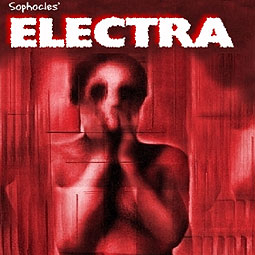Explore this scene
Scene Overview
Note: We are not able to display the full text for this scene.
- Female: 2
- Male: 0
More Scenes
Context
Electra is the daughter of King Agamemnon and Queen Clytemnestra. While Agamemnon was away at war, Clytemnestra took his cousin Aegisthus as her lover. When Agamemnon returned home, Clytemnestra and Aegisthus murdered him and assumed power. Electra’s more subservient sister Chrysothemis yielded to the new rulers, but the grief-stricken Electra refused and now continues to mourn Agamemnon against her mother’s orders. Convinced that Agamemnon’s murder was justified because he sacrificed his
to read the context for this scene from Electra (Sophocles) and to unlock other amazing theatre resources!Text
Note: We are not able to display the full text for this scene. However, to assist users who already have access to the script, starting and ending lines are presented below. Please visit our scenes database to find scenes that include text.
ELECTRA: Where are you going? And those offerings— the ones you’re carrying—who are they for? CHRYSOTHEMIS: Mother sent me out to take libations and these offerings to our father’s grave. ELECTRA: What are you saying? She’s sending those for her worst enemy? CHRYSOTHEMIS: “The one she murdered”— that’s what you’d like to add. ELECTRA: What friend of hers persuaded her to do it? Whose idea was it? CHRYSOTHEMIS: I think it was a vision in the night—it frightened her. ELECTRA: O my ancestral gods, stand by me now at last! CHRYSOTHEMIS: Why does her fear rouse in you such hope? ELECTRA: I will explain that, once you have described her vision to me. CHRYSOTHEMIS: I don’t know much about it—just a little. ELECTRA: Tell me what you know. Some minor details have often tripped men up or saved them. CHRYSOTHEMIS: They say she saw our father—yours and mine— come back to life and with her once again. He took the scepter which he used to bear, the one now carried by Aegisthus, and fixed it in the ground beside the hearth. From that scepter grew a flourishing branch which cast a shadow over all Mycenae. That’s what I heard from someone who was there as she was talking to the sun about her dream. That’s all I know, except she sent me out because she was afraid. And now I beg you, by all our family gods, take my advice. Don’t let such thoughtlessness destroy you! If you reject me now, you’re going to suffer— and then you’ll come to me and beg for help. ELECTRA: Dear sister, do not let what you are holding touch our father’s tomb. Piety and custom do not permit you to bring burial gifts to our dead father from his hateful wife or pour libations. Throw them to the winds, or hide them in a deep and dusty hole, where no offering of hers is ever near our father’s resting place. When she is dead, let those treasures be there, preserved for her deep in the earth. If she were not by nature the most reckless of all women, she would never have such detestable libations offered to the man she killed. And consider this-- do you believe the dead man in his grave will accept such tributes and feel affection for the woman who dishonored him in death, treating him as one might treat an enemy—with mutilation—and who, to cleanse herself, wiped the bloodstained ax on her victim’s head. Surely you do not think those offerings can possibly absolve her of the murder? That will not happen. Set those gifts aside, and trim a lock of hair on your own head. Take some of mine as well. As an offering, it’s not worth much, but in my wretched state it’s all I have. Offer him this unwashed hair and this plain, unembroidered belt of mine. Kneel down, and beg him to return to us—to come in person from beneath the earth, a welcome help against our enemies. CHRYSOTHEMIS: I intend to. It makes no sense at all, when dealing with an action that is just, for the two of us to argue. Instead, we should be hastening to perform it. But, my friends, in the name of the gods, when I attempt to carry out this rite, you must not say a word. For I know this— if my mother hears about this venture, I’ll pay a bitter price for what I’ve done.
Citation: Sophocles translated by Ian Johnston, Electra, Public domain.
Videos
Sorry! We do not currently have videos for this guide.
Related Articles
Related Learning Modules
All scenes are the property and copyright of their owners.
Scenes are presented on StageAgent for educational purposes only. If you would like to give a public performance of this scene, please obtain authorization from the appropriate licensor.
